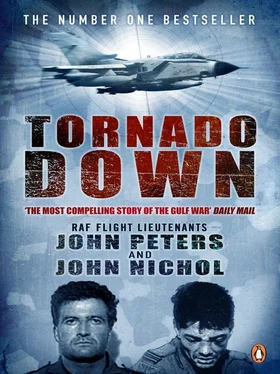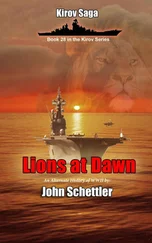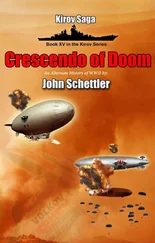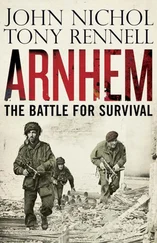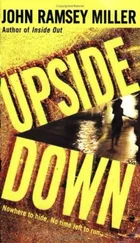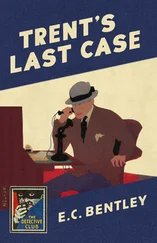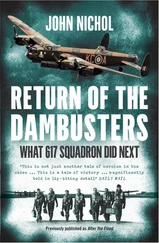Christmas Day was a normal working day for the Squadron. Our formation was the ‘duty planning team’, which meant that we were the unfortunates who were stuck on the ground planning the sorties for the next day. There had been a bit of competition as to who would be flying that day: very few aircrew had ever entered 25 December in their flying logbooks!
There was a big fly-past later, with the Victors, Jaguars and Tornados of the RAF detachment flying a superb formation trail over the airfield, which gave the old morale a bit of a lift. In the evening, John and I had arranged a party in the hotel. Everybody turned up, not only all of the aircrew, but the nurses from the Army field hospital, a large contingent from the Gulf Air air-hostess school and a lot of our new-found expatriate friends. The ballroom was looking extremely tinselly; there was good food, fine wines and an excellent band. Suddenly it all felt a lot more like the kind of Christmas our loved ones would be enjoying at home. It was a perfect release from the preceding week’s long, hot slog. Next morning we were slogging again.
John Nichol: After Christmas, we had four days’ training in Tabuk, way up in northwestern Saudi Arabia near the border with Iraq. This was something else, the obverse of life in Bahrain: here it felt very close to war, and not just geographically. The guys there were not living in nice conditions, they were living eight people to a space that was built for two. The whole place had been thrown up from scratch out of Porta-kabins and the ubiquitous oil-drum, but despite this it was very impressive. Half of it was semi-buried in the sand, to provide protection. But it was overcrowded. In some cases people were having to sleep on the verandahs, and in winter the desert nights could be very cold indeed – with temperatures frequently dropping below freezing-point. Because of the physical hardships, or perhaps in spite of them, the Tabuk squadrons had a real spirit going: their morale was sky-high, the sense of operational readiness was tremendous. They were living behind the wire, living and working for war twenty-four hours a day. To relieve our guilt about the good time we were having in Bahrain, in our soft and comfortable hotel, we took them over twenty litres of whisky and a few cases of wine – strictly unofficially. They were particularly pleased to hear about the 300 trainee air-hostesses they were missing.
We did some truly excellent flying around Tabuk, through narrow gorges, so narrow JP was continually having to roll the Tornado onto its side, to squeeze through the sheer sandstone cliffs soaring high above us. We flew through the most fantastic rock ormations, sculpted by sandstorms. To look at, it was stunning; to fly through, a joy.
We were very well looked after at Tabuk by Squadron Leader Kevin Weeks, a marvellous man and a good friend, who had been with us previously on XV Squadron, before his posting to 16. Tragically, he was soon to be killed, with his pilot, Squadron Leader Gary Lennox, on a combat mission over Iraq. On the last evening we were there, Kev took us out to his favourite local restaurant, a Turkish eatery in Tabuk town. It was already just about full, but we squeezed into a table near the back. They had the news going on the television in the corner.
Tariq Aziz, then Iraqi Foreign Minister, was holding last-ditch talks in Geneva with US Secretary of State James Baker, in another final effort to prevent the war. This, of course, was some weeks after the UN had passed its crucial Resolution 678 on 29 November, calling on Iraq to withdraw from Kuwait by 15 January, and authorising the use of ‘all necessary means’ to enforce that withdrawal, should Iraq choose to ignore the deadline. There was a tense atmosphere in the restaurant as we waited for Baker to come out of the negotiations: everybody stopped eating for a minute, and laid down their forks. Right across the restaurant, wherever you chose to look, all eyes were glued to the television screen. Despite the tension, there was hardly anybody there who thought the Iraqis would go the distance. Baker had actually taken along to the meeting photographs of the Coalition forces massed and still massing against Iraq, to show Aziz the kind of muscle Iraq would be confronting, just so there was no mistake about it.
Maybe if he had taken a picture of JP eating his kebab to show Aziz, the war would have been averted. Everyone believed that Saddam Hussein would give way, while he still had the chance. We were all passing comments like: ‘Well, this is it, we’ll all be back off home soon, the Iraqis are bound to see reason… They’ll have to pull their troops out of Kuwait now, there is no other option for them… Aziz is bound to back down… Surely when they realise the enormous scope, the magnitude of the war machine coming at them…?’ Would Saddam Hussein really topple his country over the abyss into war? He would have to be mad. But then, a lot of people thought he was mad. None of us wanted war, but we were rational. Was he?
Baker came out, looking very grave. He told the waiting reporters: ‘I have to announce that we have no news. Things do not look good.’ He had informed Aziz of the UN deadline, and made clear to him -crystal clear – that if Iraq did not withdraw unilaterally by that date, Coalition hostilities against Iraq might commence at any time. The Iraqis, it seemed, were unmoved by this prospect. We were dumbfounded. Knowing what we knew, seeing what we saw every day, the gathering Armageddon, it seemed inconceivable that the Iraqis would seek to fight. There was just no way we could see them winning, at least not in any military sense of the word: the forces ranged against them were so vast, so varied, and so technologically formidable.
The next day, we returned to Bahrain.
John Peters: To tackle certain targets effectively you need a concentration of forces, so the attacking aircraft have to take fuel – ‘tank’ – in pairs on the way to their objective. Sometimes, there may be so many aircraft in an attack, they have to wait in a queue to fill up, like cars at a petrol station just before a price hike. When the war was under way, there were aircraft that were not even on the same mission queuing up for fuel behind a single Tristar or a solo VC-10, so enormous was the pressure on the tankers. In this kind of rush-hour traffic, it needed a lot of practising to make it safe.
In early January, our Tornado was one of an eight-aircraft formation attempting to link up with two tankers. The weather was bad. There was a lot of heavy cloud around that night. It is impossible to tank at night in cloud. The Victors try to help by searching continually for clear sky, and steering everybody into that – but it means alterations of the course. The object was to get each Tornado four-ship refuelling from the Victors at the same time and on the same heading. Getting four Tornados onto one tanker under these circumstances – well, just about, maybe, perhaps. But eight Tornados onto two tankers was what you might call a complex scenario: not a bad test of spatial and positional awareness. It was a three-dimensional waltz in the dark, and we were still learning the steps.
The two tankers were supposed to be height-split by a thousand feet, but for some reason they were not, they were much closer together than that. They were meant to be in a specified area – they were not, they were somewhere else entirely. Ninety-nine times out of a hundred, they would be there, bang on the rendezvous point. But just this once, they were miles off. The Victors, it seemed, had had a bit of a problem with their navigational equipment… This was rapidly turning into a very intense and thought-provoking exercise! We had four pairs of aircraft scrabbling around in cloud, at night, to get onto two tankers, in the same little box of airspace – and the tanker they were trying to plug into kept disappearing in the clammy clag… All this was happening at more than 400 miles per hour. Not to overstate it, it was hairy: it had hairs all over it. All the high-tech stuff, the computers and the radars, suddenly went for very little. We were right back down to basics. Art had replaced science, with pilot and navigator working together to keep the ‘big air picture’ sufficiently sharp that they did not collide with anything.
Читать дальше
